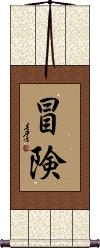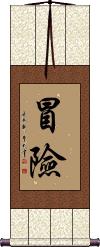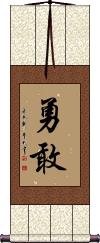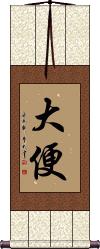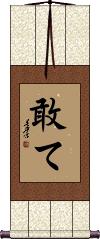Many custom options...
And formats...

Dare in Chinese / Japanese...
Buy a Dare calligraphy wall scroll here!
Personalize your custom “Dare” project by clicking the button next to your favorite “Dare” title below...
Adventure
冒険 is a common Japanese way to say “Adventure.”
The first character can mean “to risk,” “to defy” or “to dare.” The second character means “inaccessible place” or “impregnable position.” Together, you get the idea of why these two characters mean adventure when put them together in Japanese.
Note: The second character is a morphed Japanese Kanji. The original Chinese version is also available and holds the same root meaning.
Adventure
冒險 is another Chinese and Korean word for “Adventure.”
This is more of a “risk-taking” version of adventure.
The first character can mean “brave” and “bold.” The second character means “dangerous” and “rugged.” Together they can be defined as a word meaning “adventure” in Chinese and Korean.
Note: Some dictionaries translate these two characters as “take a risk.”
Bravery / Courage
Courage in the face of Fear
勇敢 is about courage or bravery in the face of fear.
You do the right thing even when it is hard or scary. When you are courageous, you don't give up. You try new things. You admit mistakes. This kind of courage is the willingness to take action in the face of danger and peril.
勇敢 can also be translated as braveness, valor, heroic, fearless, boldness, prowess, gallantry, audacity, daring, dauntless, and/or courage in Japanese, Chinese, and Korean. This version of bravery/courage can be an adjective or a noun. The first character means bravery and courage by itself. The second character means “daring” by itself. The second character emphasizes the meaning of the first but adds the idea that you are not afraid of taking a dare, and you are not afraid of danger.
勇敢 is more about brave behavior and not so much the mental state of being brave. You'd more likely use this to say, “He fought courageously in the battle,” rather than “He is very courageous.”
Daredevil Warrior / Soul of a Warrior
鬼武者 is an unusual title that can be translated two ways, daredevil warrior or demon warrior.
The most common is probably the daredevil warrior. However, the first character means demon, ghost, or soul of the departed. Therefore, it can mean the soul of a warrior or a demon warrior.
This title is Japanese only, and should not be used if your audience is Chinese.
Better Late Than Never
It's Never Too Late Too Mend
Long ago in what is now China, there were many kingdoms throughout the land. This time period is known as “The Warring States Period” by historians because these kingdoms often did not get along with each other.
Sometime around 279 B.C. the Kingdom of Chu was a large but not particularly powerful kingdom. Part of the reason it lacked power was the fact that the King was surrounded by “yes men” who told him only what he wanted to hear. Many of the King's court officials were corrupt and incompetent which did not help the situation.
The King was not blameless himself, as he started spending much of his time being entertained by his many concubines.
One of the King's ministers, Zhuang Xin, saw problems on the horizon for the Kingdom, and warned the King, “Your Majesty, you are surrounded by people who tell you what you want to hear. They tell you things to make you happy and cause you to ignore important state affairs. If this is allowed to continue, the Kingdom of Chu will surely perish, and fall into ruins.”
This enraged the King who scolded Zhuang Xin for insulting the country and accused him of trying to create resentment among the people. Zhuang Xin explained, “I dare not curse the Kingdom of Chu but I feel that we face great danger in the future because of the current situation.” The King was simply not impressed with Zhuang Xin's words.
Seeing the King's displeasure with him and the King's fondness for his court of corrupt officials, Zhuang Xin asked permission from the King that he may take leave of the Kingdom of Chu, and travel to the State of Zhao to live. The King agreed, and Zhuang Xin left the Kingdom of Chu, perhaps forever.
Five months later, troops from the neighboring Kingdom of Qin invaded Chu, taking a huge tract of land. The King of Chu went into exile, and it appeared that soon, the Kingdom of Chu would no longer exist.
The King of Chu remembered the words of Zhuang Xin and sent some of his men to find him. Immediately, Zhuang Xin returned to meet the King. The first question asked by the King was “What can I do now?”
Zhuang Xin told the King this story:
A shepherd woke one morning to find a sheep missing. Looking at the pen saw a hole in the fence where a wolf had come through to steal one of his sheep. His friends told him that he had best fix the hole at once. But the Shepherd thought since the sheep is already gone, there is no use fixing the hole.
The next morning, another sheep was missing. And the Shepherd realized that he must mend the fence at once. Zhuang Xin then went on to make suggestions about what could be done to reclaim the land lost to the Kingdom of Qin, and reclaim the former glory and integrity of the Kingdom of Chu.
The Chinese idiom shown above came from this reply from Zhuang Xin to the King of Chu almost 2,300 years ago.
It translates roughly into English as...
“Even if you have lost some sheep, it's never too late to mend the fence.”
This proverb, 亡羊补牢犹未为晚, is often used in modern China when suggesting in a hopeful way that someone change their ways, or fix something in their life. It might be used to suggest fixing a marriage, quitting smoking, or getting back on track after taking an unfortunate path in life among other things one might fix in their life.
I suppose in the same way that we might say, “Today is the first day of the rest of your life” in our western cultures to suggest that you can always start anew.
Note: This does have Korean pronunciation but is not a well-known proverb in Korean (only Koreans familiar with ancient Chinese history would know it). Best if your audience is Chinese.
Shit / Defecate / Excrement / Feces / Poop
NOT APPROPRIATE FOR
CUSTOM CALLIGRAPHY
Seems a lot of you want to know how to write “shit” in Chinese, Japanese Kanji, and old Korean Hanja. Well, here it is.
Do not, under any circumstances, try to order this selection for a wall scroll. None of the calligraphers that I work with would dare to lower themselves to such a level and actually write “shit” for you. 大便 is only here for reference. 大便 is not appropriate for custom calligraphy!
大便 is thousands of years old and was absorbed into both Japanese and Korean (if you note, the pronunciation is very similar in all three languages).
This version is sometimes used as a verb (when used with some other words).
Take Up a Challenge
敢て is a Japanese word that can mean a few things related to the idea of taking up a challenge.
It can be defined as daring (to do something), venturing (often overcoming reluctance), or taking action (even in the face of probable failure). It can also be to take upon oneself or take up a challenge.
These search terms might be related to Dare:
Risk / Venture
Risk Taker
Take Up a Challenge
Not the results for dare that you were looking for?
Below are some entries from our dictionary that may match your dare search...
| Characters If shown, 2nd row is Simp. Chinese |
Pronunciation Romanization |
Simple Dictionary Definition |
敢 see styles |
gǎn gan3 kan tsuyoshi つよし |
to dare; daring; (polite) may I venture (personal name) Tsuyoshi To dare, venture. |
誰 谁 see styles |
shei shei2 shei dare(p); daare; tare(ok); ta(ok) / dare(p); dare; tare(ok); ta(ok) だれ(P); だあれ; たれ(ok); た(ok) |
who; also pr. [shui2] (pronoun) (だあれ is emphatic or inquisitive) who who? |
不敢 see styles |
bù gǎn bu4 gan3 pu kan fukan |
dare not |
勇於 勇于 see styles |
yǒng yú yong3 yu2 yung yü |
to dare to; to be brave enough to |
垂れ see styles |
tare(p); dare; tare; dare たれ(P); だれ; タレ; ダレ |
(1) (kana only) (oft. ダレ in compounds) sauce (esp. soy or mirin-based dipping sauce); (2) (たれ only) hanging; something hanging (flap, lappet, etc.); (3) (たれ only) (kendo) loin guard; (4) (たれ only) kanji radical enclosing the top-left corner of a character; (suffix noun) (5) (たれ, タレ only) (kana only) (derogatory term) (used after a noun or na-adjective; also ったれ) -ass; -head |
挑戦 see styles |
chousen / chosen ちょうせん |
(n,vs,vi) challenge; defiance; dare; attempt; try |
敢於 敢于 see styles |
gǎn yú gan3 yu2 kan yü |
to have the courage to do something; to dare to; bold in |
敢為 敢为 see styles |
gǎn wéi gan3 wei2 kan wei kani かんい |
to dare to do daring; (personal name) Isana |
膽敢 胆敢 see styles |
dǎn gǎn dan3 gan3 tan kan |
to dare (negative connotation); to have the audacity to (do something) |
豈敢 岂敢 see styles |
qǐ gǎn qi3 gan3 ch`i kan chi kan |
how could one dare?; I don't deserve such praise |
ターレ see styles |
daare / dare ダーレ |
(place-name) Dale |
デアー see styles |
deaa / dea デアー |
(personal name) Dare |
不敢當 不敢当 see styles |
bù gǎn dāng bu4 gan3 dang1 pu kan tang |
lit. I dare not (accept the honor); fig. I don't deserve your praise; you flatter me |
善くも see styles |
yokumo よくも |
(adverb) (kana only) how dare ...; how could ... |
恐らく see styles |
osoraku おそらく |
(adverb) (kana only) (oft. used when predicting a negative outcome) probably; (most) likely; in all likelihood; I suspect; I dare say; I'm afraid |
惹不起 see styles |
rě bu qǐ re3 bu5 qi3 je pu ch`i je pu chi |
can't afford to offend; dare not provoke; difficult to deal with; insufferable |
敢能當 敢能当 see styles |
gǎn néng dāng gan3 neng2 dang1 kan neng tang kannōtō |
to dare to match himself against (?) |
有本事 see styles |
yǒu běn shi you3 ben3 shi5 yu pen shih |
to have what it takes; (coll.) (often followed by 就[jiu4]) (used to challenge sb) if you're so clever, ..., if she's so tough, ... etc; Example: 有本事就打我[you3 ben3 shi5 jiu4 da3 wo3] Hit me if you dare! |
肝練り see styles |
kimoneri きもねり |
(1) dare; (2) (hist) (orig. meaning) Russian roulette-style game |
肝試し see styles |
kimodameshi きもだめし |
test of courage; dare |
よくまあ see styles |
yokumaa / yokuma よくまあ |
(adverb) (See よくも・1) how (dare you) |
不敢高攀 see styles |
bù gǎn gāo pān bu4 gan3 gao1 pan1 pu kan kao p`an pu kan kao pan |
lit. not dare to pull oneself up high (humble term); I cannot presume on your attention |
Variations: |
tare(p); dare; tare; dare たれ(P); だれ; タレ; ダレ |
(1) (kana only) (oft. ダレ in compounds) sauce (esp. soy or mirin-based dipping sauce); (2) (たれ only) hanging; something hanging (flap, lappet, etc.); (3) (たれ only) {MA} (kendo) loin guard; (4) (たれ only) kanji radical enclosing the top-left corner of a character; (5) (たれ, タレ only) (slang) (kana only) (comedian jargon) woman; (suffix noun) (6) (たれ, タレ only) (kana only) (derogatory term) (used after a noun or na-adjective; also ったれ) -ass; -head |
恐らくは see styles |
osorakuha おそらくは |
(adverb) (kana only) (oft. used when predicting a negative outcome) probably; (most) likely; in all likelihood; I suspect; I dare say; I'm afraid |
愧不敢當 愧不敢当 see styles |
kuì bù gǎn dāng kui4 bu4 gan3 dang1 k`uei pu kan tang kuei pu kan tang |
lit. I'm ashamed and dare not (accept the honor); fig. I do not deserve your praise.; You flatter me too much. |
敢不從命 敢不从命 see styles |
gǎn bù cóng mìng gan3 bu4 cong2 ming4 kan pu ts`ung ming kan pu tsung ming |
to not dare to disobey an order (idiom) |
敢作敢為 敢作敢为 see styles |
gǎn zuò gǎn wéi gan3 zuo4 gan3 wei2 kan tso kan wei |
(idiom) to stop at nothing; to dare to do anything |
敢為人先 敢为人先 see styles |
gǎn wéi rén xiān gan3 wei2 ren2 xian1 kan wei jen hsien |
to dare to be first; to pioneer (idiom) |
肝だめし see styles |
kimodameshi きもだめし |
test of courage; dare |
這還了得 这还了得 see styles |
zhè hái liǎo dé zhe4 hai2 liao3 de2 che hai liao te |
How dare you!; This is an outrage!; Absolutely disgraceful! |
Click here for more dare results from our dictionary
The following table may be helpful for those studying Chinese or Japanese...
| Title | Characters | Romaji (Romanized Japanese) | Various forms of Romanized Chinese | |
| Adventure | 冒険 | bou ken / bo ken | ||
| Adventure | 冒險 冒险 | mào xiǎn / mao4 xian3 / mao xian / maoxian | mao hsien / maohsien | |
| Bravery Courage | 勇敢 | yuu kan / yuukan / yu kan | yǒng gǎn / yong3 gan3 / yong gan / yonggan | yung kan / yungkan |
| Daredevil Warrior Soul of a Warrior | 鬼武者 | oni mu sha / onimusha | ||
| Better Late Than Never | 亡羊補牢猶未為晚 亡羊补牢犹未为晚 | wáng yáng bǔ láo yóu wèi wéi wǎn wang2 yang2 bu3 lao2 you2 wei4 wei2 wan3 wang yang bu lao you wei wei wan | wang yang pu lao yu wei wei wan wangyangpulaoyuweiweiwan |
|
| Shit Defecate Excrement Feces Poop | 大便 | dai ben / daiben | dà biàn / da4 bian4 / da bian / dabian | ta pien / tapien |
| Take Up a Challenge | 敢て | aete | ||
| In some entries above you will see that characters have different versions above and below a line. In these cases, the characters above the line are Traditional Chinese, while the ones below are Simplified Chinese. | ||||
Successful Chinese Character and Japanese Kanji calligraphy searches within the last few hours...
